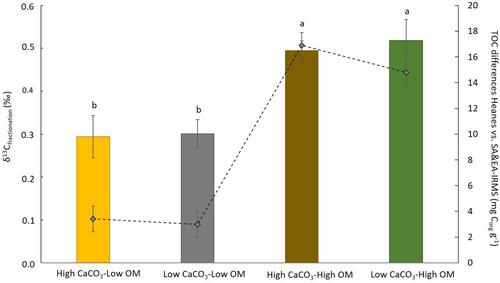Flaws in the methodologies for organic carbon analysis in seagrass blue carbon soils
IF 2.1
3区 地球科学
Q2 LIMNOLOGY
引用次数: 0
Abstract
The ability to accurately measure organic carbon (OC) in marine sediments or soils is overall taken for granted in scientific communities, yet this seemingly mundane task remains a methodological challenge when the soil matrix contains calcium carbonate (CaCO3), creating inaccuracies in Blue Carbon estimates. Here, we compared five common methods combining acidification, combustion, and wet oxidation pre‐treatments for determination of OC in sediments and soils containing CaCO3 based on the analyses of artificial soil mixtures made of different OC and CaCO3 contents, and multiple soils from Australian seagrass cores. The results obtained showed that methods involving acidification pre‐treatment entailed −17 ± 0.2% (mean ± SE) underestimation of OC content (ranging from −8% to −26%), whereas the combustion‐based method was accurate for samples with high CaCO3 content but entailed 32–47% overestimation in samples with low CaCO3 content. The Heanes method (wet oxidation method) showed <5% deviation from the known OC content, but this method is not suitable for soil samples containing reduced iron, sulfur and potentially manganese compounds. The differences observed among methods have significant impacts on local, regional, and global Blue Carbon storage calculations. We provide key methodological guidelines for the analysis of OC in soils with high and low CaCO3 contents, aiming at improving accuracy in current Blue Carbon science.

海草蓝碳土壤中有机碳分析方法的缺陷
在科学界,准确测量海洋沉积物或土壤中的有机碳(OC)的能力总体上被认为是理所当然的,然而,当土壤基质中含有碳酸钙(CaCO3)时,这项看似平凡的任务仍然是一个方法论上的挑战,从而导致蓝碳估算的不准确性。在此,我们比较了5种常用的酸化、燃烧和湿氧化预处理方法在含CaCO3沉积物和土壤中测定OC的方法,该方法基于不同OC和CaCO3含量的人工混合土壤和来自澳大利亚海草岩心的多种土壤的分析。结果表明,采用酸化预处理的方法对OC含量的低估为- 17±0.2%(平均±SE)(范围从- 8%到- 26%),而基于燃烧的方法对CaCO3含量高的样品是准确的,但对CaCO3含量低的样品则有32-47%的高估。Heanes法(湿氧化法)与已知的OC含量偏差为<5%,但该方法不适用于含有还原铁,硫和潜在锰化合物的土壤样品。不同方法之间的差异对本地、区域和全球蓝碳储量的计算有显著影响。本文为高、低CaCO3含量土壤中有机碳的分析提供了关键的方法指南,旨在提高当前蓝碳科学的准确性。
本文章由计算机程序翻译,如有差异,请以英文原文为准。
求助全文
约1分钟内获得全文
求助全文
来源期刊
CiteScore
4.80
自引率
3.70%
发文量
56
审稿时长
3 months
期刊介绍:
Limnology and Oceanography: Methods (ISSN 1541-5856) is a companion to ASLO''s top-rated journal Limnology and Oceanography, and articles are held to the same high standards. In order to provide the most rapid publication consistent with high standards, Limnology and Oceanography: Methods appears in electronic format only, and the entire submission and review system is online. Articles are posted as soon as they are accepted and formatted for publication.
Limnology and Oceanography: Methods will consider manuscripts whose primary focus is methodological, and that deal with problems in the aquatic sciences. Manuscripts may present new measurement equipment, techniques for analyzing observations or samples, methods for understanding and interpreting information, analyses of metadata to examine the effectiveness of approaches, invited and contributed reviews and syntheses, and techniques for communicating and teaching in the aquatic sciences.

 求助内容:
求助内容: 应助结果提醒方式:
应助结果提醒方式:


